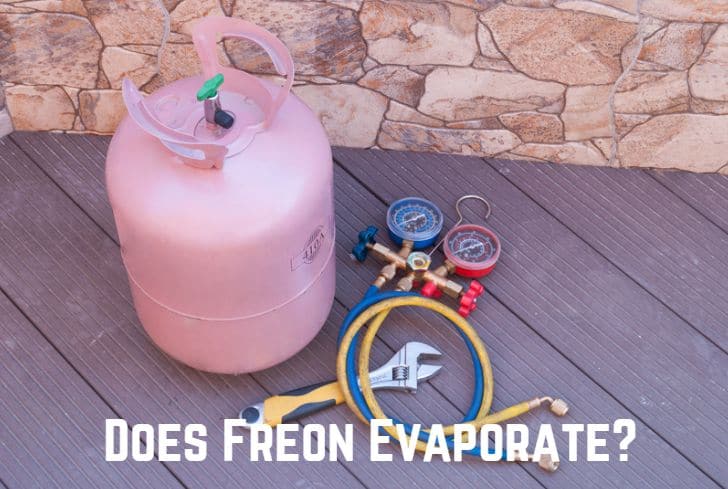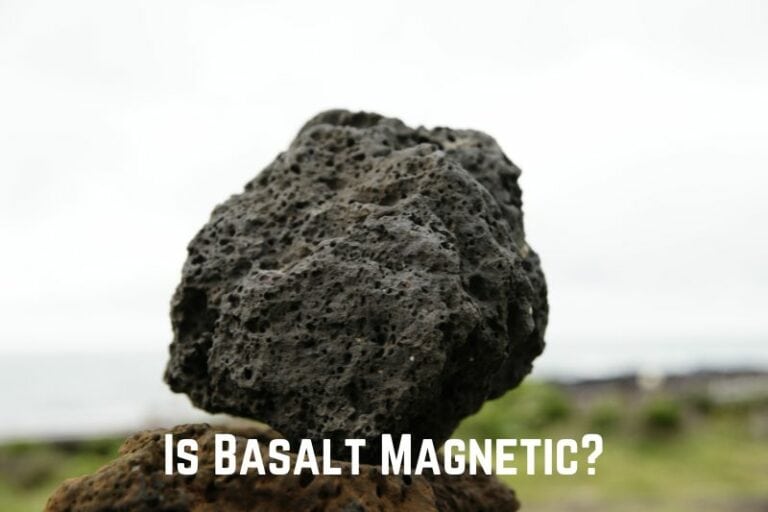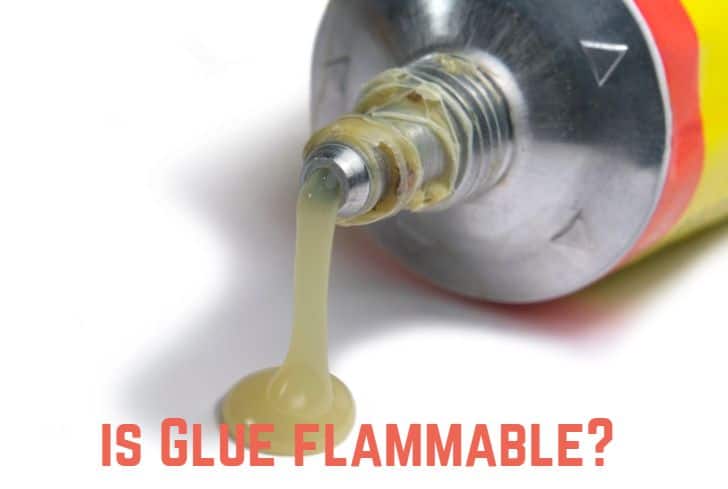Does Freon Evaporate? (Yes. It Does)

A chemical coolant called freon is used in air conditioners, whether it is in your car, house, or refrigerator. Freon gas is crucial for the operation of your air conditioner. Regrettably, it does occasionally happen that your air conditioner might stop working. Perhaps the freon in your air conditioner has run out. But how did freon leave the air conditioning system? Does freon evaporate?
That is an important question that we shall answer in this article. Also, we’ll explain if freon evaporates over time in a car, how long it takes to leak out, and at what temperature. You’ll be curious to learn whether freon leaks from an air conditioning machine without a visible leak, how long it stays in the air, and whether it freezes.
Read: Does Lighter Fluid Evaporate?
Does Freon Evaporate When It Leaks?
Freon will evaporate if your car’s AC system leaks. By absorbing the heat from the surroundings, freon helps to keep the air cool. It cools the air while evaporating. Freon does not evaporate from the system or absorb moisture without a leak. Remember that freon is essential; without it, the air conditioner will not function.
The air conditioner maintains a cool interior temperature by freon condensation and evaporation. Condenser, evaporator, and compressor coils make up an air conditioner system. When one of the three elements gets a hole, there is a freon leak. An air conditioner needs to have a specific volume of freon to function. A leak compromises the effectiveness of the entire system.
The heat transfer rate decreases when there is less freon flowing through. Replacing freon in your AC is a relatively easy job. It is beneficial to have the mechanic inspect the entire system for leaks. You might stop your AC from suffering additional damage.
Does Freon Evaporate Over Time in a Car?
Yes, freon does evaporate over time in a car. The gas can last about 3 to 5 years if you maintain regular maintenance. Nonetheless, the components of the AC will be affected by the outside temperature—high temperatures cause your air conditioner to work harder, which quickens its wear and tear.
Freon will eventually evaporate if you drive your car a lot and for long distances. The AC will develop some leaks due to mileage-related wear and tear. It will release freon. The compressor will break down from low freon levels, which will lower the effectiveness of the air conditioning system.
Here is: How to Find AC Leaks in Your Car (UV Dye)
Over time, freon will evaporate due to weak or defective rubber seals. Rubber seals cover the valves that enable freon to enter through the coils. When the freon evaporates, these seals deteriorate over time. Coil joints in some places can cause freon to evaporate.
A stuck Schrader valve, like the one in your tire, might cause freon to leak. Specific AC components are composed of rust-prone metals, primarily copper metal. A freon leak occurs due to the parts cracking due to corrosion.
A small amount of freon will leak as it protects the compressor seal from drying out. Hence, every year your car will lose a small amount of freon.
How Long Does It Take for Freon to Leak Out?
The length of time that freon leaks depend on how bad the leaks are. It can take a few weeks if there are numerous leaks or a single large leak. It can take a few months if the leak is minor. Before you notice a freon leak, it could take some time.
To identify when freon is leaking out, keep an eye out for the following signs:
- Lack of cooling from the air conditioner, particularly in hot weather
- Whenever you turn on your air conditioner, you hear a “click” sound. The compressor clutch pressing the freon is what is making the noise.
- You see that the automobile compressor is starting to get iced over.
- You notice a thin bright green, oily liquid, around the compressor, under the hood, within the cabin, or under the car.
- If Freon is leaking, you will smell a distinctive sweet fragrance.
Can an AC Unit Lose Freon Without a Leak?
The only time freon should flow out of an AC unit is when there is a leak. With a sealed refrigerant system, which prevents freon gas from escaping, freon circulates. Freon is guaranteed to go through multiple stages before becoming a gas because of the closed system. The gas does not go break down, become faulty, or leak.
If the AC does not leak, it becomes difficult for freon to flow out of the car. Hence, if the freon in your AC is low, look for leaks before replacing it. Sealing your leak will save you from losing a lot of freon, given its cost.
When you check the unit for pressure during maintenance, the only other way an AC unit might lose freon without a leak is then. Most technicians tighten the service port caps (where the lines connect to the outside unit). The access ports are prone to leaks.
At What Temperature Does Freon Evaporate?
At its boiling point, between 40 and 50 °F (4 and 10 °C), freon evaporates. Compared to the water’s boiling point, it is substantially lower. The air passing over the evaporator coil generates heat. The process begins when the cool liquid freon enters the indoor coil(evaporator). The freon in the coil evaporates.
Freon absorbs heat when it transforms from a liquid to a vapor at the abovementioned temperature. Moist air gives up heat as it passes over the cool coil, and moisture may condense.
How Long Does Freon Stay in the Air?
Freon is highly volatile and does not linger in the air long. It will continue to smell for 20 to 30 minutes. Yet, freon is four times heavier than air, so it will initially sink to the ground when a leak happens. So, it is more likely for children, pets, or shorter people to breathe in a lot of freon.
Your lungs will inhale freon in place of ordinary air. Don’t ignore the freon leaks. Freon contains harmful compounds (fluorinated hydrocarbons)) that have an impact on the air quality. Although it contains quantities of chlorine and fluorine, the main chemical components of freon are hydrogen and carbon.
When you breathe in air containing freon, you will experience the symptoms below.
- Immediate symptoms: Coughing, eye and skin irritation, headaches, nausea, vomiting, and difficulty in breathing.
- Long-term effects: Seizures, irregular heartbeats, labored breathing, the buildup of fluids in the lungs, and mental fatigue.
The good news is that freon is quickly eliminated from the body after inhalation, so it may not build up significantly. Only inhalation of very high quantities is freon harmful.
When freon comes into touch with an open flame, this can also result in problems. It will probably produce toxic fumes. Kitchens tend to have more open flames, and a freon leak from the refrigerator can be dangerous.
Does Freon Freeze?
Although rare, freon can freeze at -50°F (-45°C). Freezing will result from evaporator coil leaks. The freon is also frozen if the side of your air conditioner where the filter is placed feels excessively cold. Also, the piping close to the unit may have some ice. Dust air filters might be a factor in freezing the freon.
The frozen evaporator coil can be resolved quickly by turning off the cooling mode. Defrost the coils while the fan is off. Remember that using the AC while in the cooling mode might seriously harm the compressor.
Defrosting can take some time, so only reactivate the cooling system after you are confident all the ice has melted.
Read: Does Kerosene Evaporate?
FAQ’s
Can I still run the Ac without freon?
If there is a small amount of freon, it is possible to run the AC, but it is not recommended. The AC has been set to run with a certain amount of freon, and without it’s impossible for the AC to operate as it should. It restricts the heat the air conditioner can absorb along the evaporator coil before the coil freezes over.
The ice will keep growing until the AC is destroyed. A lack of freon will also lead to damage to the compressor, which will cause it to overheat.
Does freon stick on surfaces?
Freon does not stick to surfaces. It is evaporative above standard room temperatures. It has a low boiling point and evaporates quickly in the open air.
Please resist the urge to touch it to check if it contains freon. Your skin becomes frostbitten at first contact before becoming rashy.
Does Freon leak as a gas or liquid?
Depending on the system’s location, freon can be a gas or a liquid. The leak will often start as “pinhole leaks” in the evaporator coil. The leak will first show up as tiny bubbles.
In the evaporator coil, it is a superheated gas and will leak as such from the coil. However, if the leak is liquid, it is not in the evaporator coil, which is a fairly unusual location. Repairing leaks outside the evaporator coil is very expensive.
Conclusion
The only way for freon leaks is if the air conditioner has holes. Your AC can sustain damage from wear and tear, bad weather, and metal-part corrosion. Nevertheless, freon quickly leaves the air even after the leak. Repairing the freon leaks is essential to prevent breathing in its dangerous compounds.



![Is Chapstick Flammable? [Lip Balm, Lipstick, Lip Gloss]](https://eartheclipse.com/wp-content/uploads/2023/03/is-chapstick-flammable.jpg)


